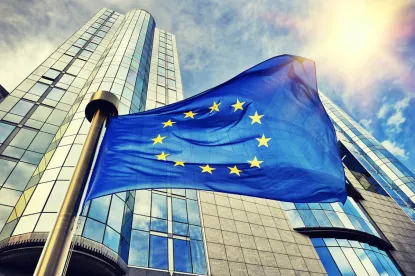On June 30, 2022, the European Parliament (EP) and the Council announced that they had reached a provisional political agreement on the EU Foreign Subsidies Regulation (FSR).
The European Commission (Commission) published an extensive white paper in 2020 stating that foreign subsidies in recent years may have distorted the EU internal market. Foreign subsidies to which the FSR applies include any financial contribution granted by a non-EU government, governmental authorities or public or private entities closely linked to a non-EU country and that confer an advantage to the recipient. A distortion on the internal markets shall be deemed to exist where a foreign subsidy is liable to improve the competitive position of the undertaking concerned in the internal market and where it actually or potentially negatively affects competition on the internal market.
With the FSR, the EU aims to close the regulatory gap between EU Member States and non-EU countries by granting the Commission the power to investigate financial contributions granted by public authorities of a non-EU country which benefit companies engaging in economic activities in the EU. The FSR also complements the EU’s international efforts to modernize subsidy rules within the World Trade Organization.
The FSR grants the Commission three tools:
-
A notification-based tool for “concentrations”;
-
a notification-based tool for tenders in public procurements; and
-
one general tool to investigate all other market situations.
Notification-Based Tools
The FSR requires companies to notify:
-
Concentrations where the acquired company, one of the merging parties, or the joint venture generates an EU turnover of at least € 500 million, and the foreign (i.e., non-EU) financial contribution to the transaction is at least € 50 million.
-
Tenders in public procurements where the estimated contract value is at least € 250 million, and the foreign (i.e., non-EU) financial contribution to the bid is at least € 4 million per third (i.e., non-EU) country.
Concentrations cannot be completed, and bidders cannot be awarded a contract until cleared by the Commission. Failure to notify could lead to fines – imposed by the Commission – which may reach 10% of the aggregated worldwide turnover. Moreover, the Commission can prohibit a subsidized concentration or the award of a public procurement contract to the subsidized bidder.
Although these thresholds may seem high, some private equity funds regularly conduct transactions involving such sums. Moreover, the broad definition of “financial contributions” could include not only subsidies but also loans, tax benefits, debt forgiveness, and more.
General Market Investigation Tool
Pursuant to the FSR, the general market investigation enables the Commission to investigate on its own initiative or request ad-hoc notifications if it suspects that a distortive foreign subsidy may be involved. This tool helps cover a wider range of market situations, such as concentrations and public procurements that do not meet the thresholds for notification.
If the Commission finds a distortive foreign subsidy, it may conduct a balancing test. If the Commission finds that the negative effects outbalance the positive effects, it may impose structural or non-structural redressive measures on companies to remedy the distortion, or accept them as commitments (e.g., the divestment of certain assets or the prohibition of certain market behavior).
Outlook and Next Steps
The provisional political agreement the EU institutions reached is subject to the EP and the Council’s formal approval. On the Council’s side, the provisional political agreement is still subject to approval by Coreper, the Permanent Representatives Committee, before going through the formal steps of the adoption procedure.
The FSR will enter into force 20 days after its publication in the EU Official Journal. The expectation is that the FSR will become directly applicable six months later. Notification obligations will apply nine months after the entry into force.
The FSR will increase the regulatory risk and burden for companies operating or investing in the EU with support from foreign States. It may also open new opportunities for strategic complaints by competitors.
In particular, the FSR will add complexity to the regulatory clearance path for mergers and acquisitions by State-backed investors involving EU targets, as companies may potentially have to file (i) notifications under the FSR regime, (ii) merger control notifications at the EU or national level, and (iii) submissions pursuant to national foreign investment review/national security regimes prior to closing.
Due to the increased regulatory uncertainty for international players operating in the EU, investors and companies may wish to monitor the receipt of any foreign subsidies to anticipate exposure to investigation by the EC, including when participating in tender procedures in the EU. This review would need to start now, since if the FSR is adopted, the Commission may well have the ability to look back three years, e.g., during a foreign subsidy review.
|




 />i
/>i
